Oral Health Disparities: Indigenous Australians & Colonization Impact
VerifiedAdded on 2021/02/20
|7
|2190
|28
Essay
AI Summary
This essay delves into the critical issue of oral health within Aboriginal and Torres Strait Islander communities in Australia. It begins with a discussion of oral health in general, highlighting its importance and the potential consequences of poor oral hygiene. The essay then presents current statistics to illustrate the burden of oral health issues within this population, emphasizing the disparities in dental care access and outcomes. A significant portion of the essay is dedicated to analyzing the historical impact of colonization on the development of oral health problems, including changes in diet and lifestyle. Furthermore, the essay examines the influence of social determinants of health, such as education, literacy, income, and social status, on the progression of oral health issues. Finally, the essay explores the cultural implications and obstacles that hinder effective oral health management within these communities, including poverty, access to healthcare, and cultural differences. The essay concludes by summarizing the key findings and emphasizing the need for targeted interventions to improve oral health outcomes for Aboriginal and Torres Strait Islander Australians.
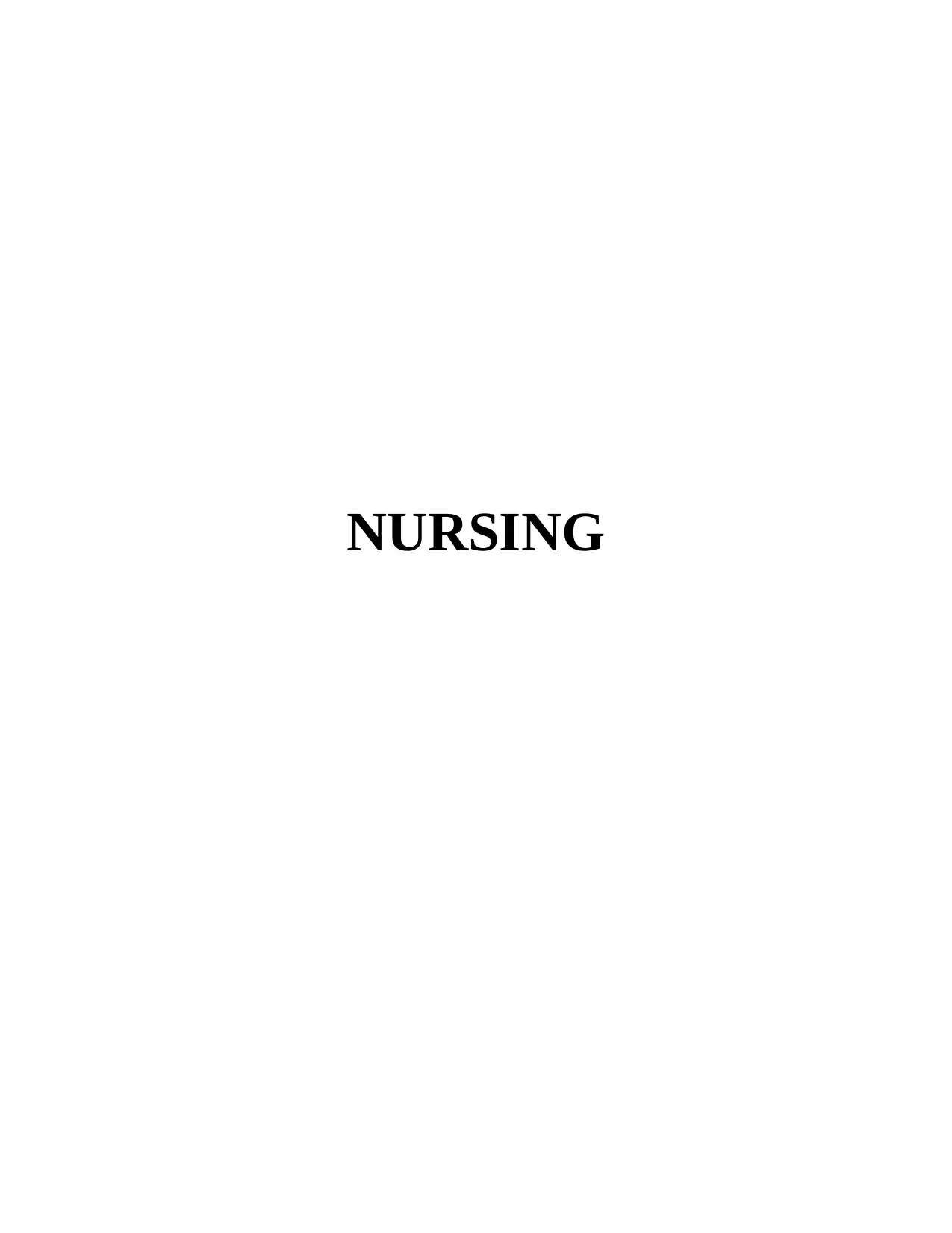
NURSING
Paraphrase This Document
Need a fresh take? Get an instant paraphrase of this document with our AI Paraphraser
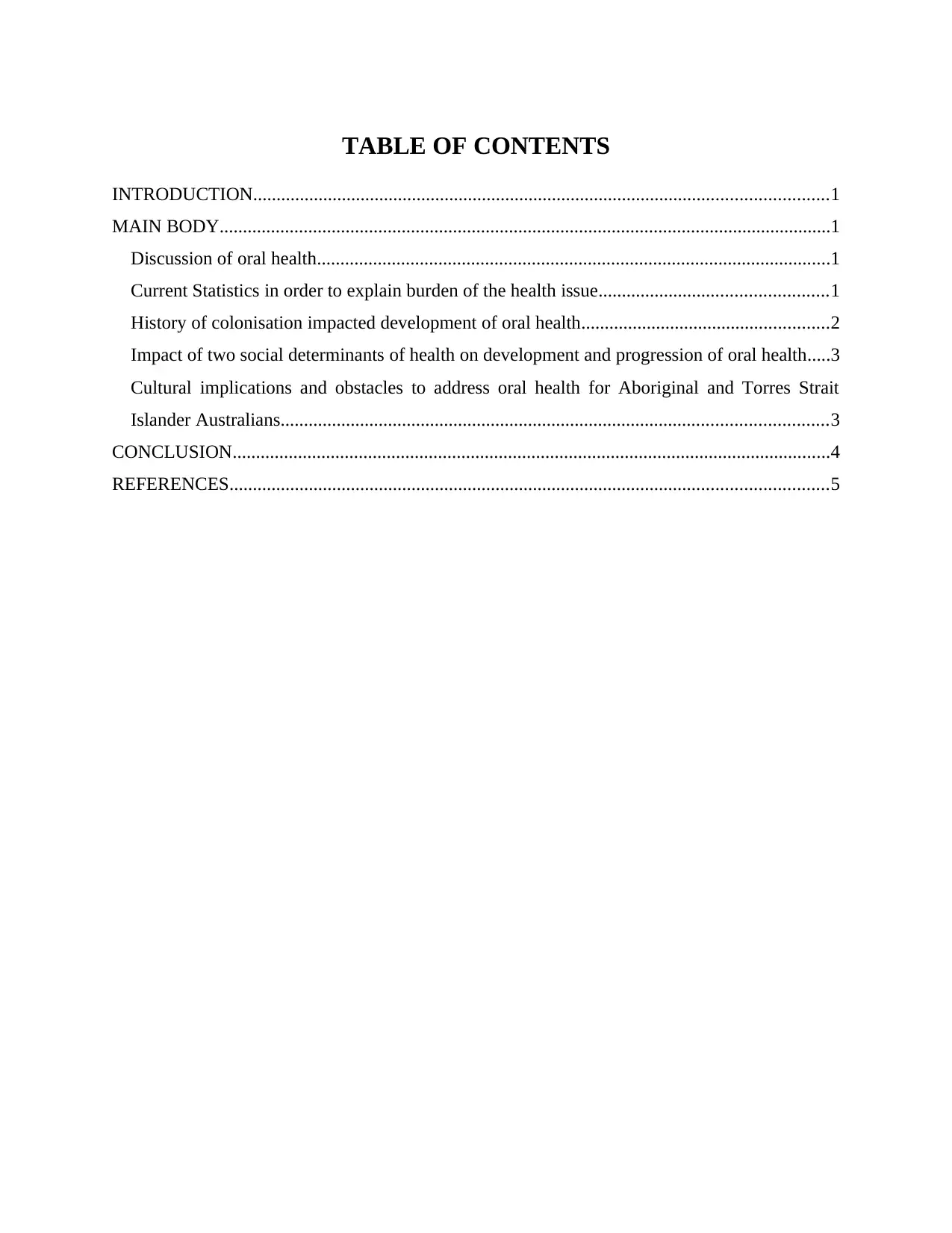
TABLE OF CONTENTS
INTRODUCTION...........................................................................................................................1
MAIN BODY...................................................................................................................................1
Discussion of oral health..............................................................................................................1
Current Statistics in order to explain burden of the health issue.................................................1
History of colonisation impacted development of oral health.....................................................2
Impact of two social determinants of health on development and progression of oral health.....3
Cultural implications and obstacles to address oral health for Aboriginal and Torres Strait
Islander Australians.....................................................................................................................3
CONCLUSION................................................................................................................................4
REFERENCES................................................................................................................................5
INTRODUCTION...........................................................................................................................1
MAIN BODY...................................................................................................................................1
Discussion of oral health..............................................................................................................1
Current Statistics in order to explain burden of the health issue.................................................1
History of colonisation impacted development of oral health.....................................................2
Impact of two social determinants of health on development and progression of oral health.....3
Cultural implications and obstacles to address oral health for Aboriginal and Torres Strait
Islander Australians.....................................................................................................................3
CONCLUSION................................................................................................................................4
REFERENCES................................................................................................................................5
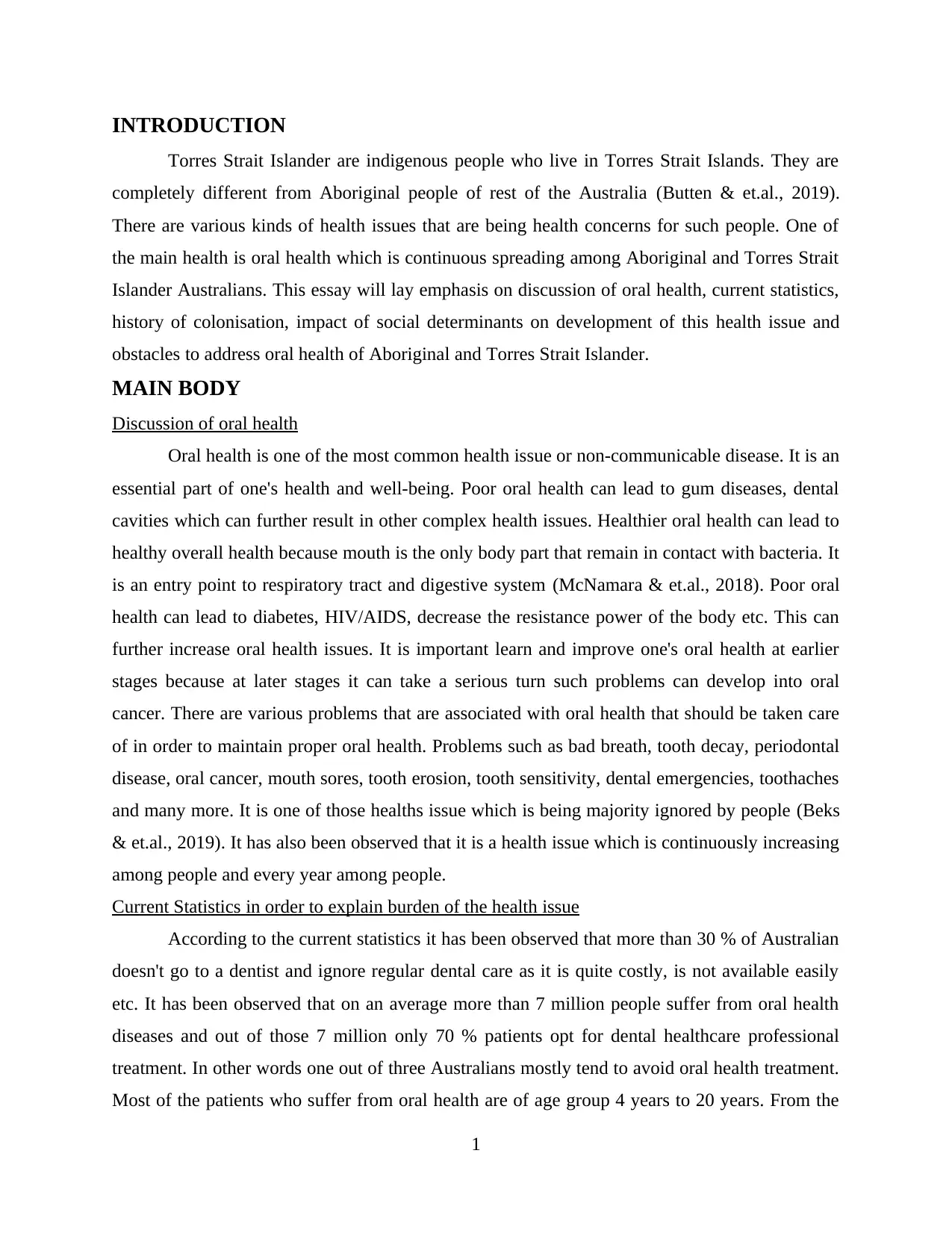
INTRODUCTION
Torres Strait Islander are indigenous people who live in Torres Strait Islands. They are
completely different from Aboriginal people of rest of the Australia (Butten & et.al., 2019).
There are various kinds of health issues that are being health concerns for such people. One of
the main health is oral health which is continuous spreading among Aboriginal and Torres Strait
Islander Australians. This essay will lay emphasis on discussion of oral health, current statistics,
history of colonisation, impact of social determinants on development of this health issue and
obstacles to address oral health of Aboriginal and Torres Strait Islander.
MAIN BODY
Discussion of oral health
Oral health is one of the most common health issue or non-communicable disease. It is an
essential part of one's health and well-being. Poor oral health can lead to gum diseases, dental
cavities which can further result in other complex health issues. Healthier oral health can lead to
healthy overall health because mouth is the only body part that remain in contact with bacteria. It
is an entry point to respiratory tract and digestive system (McNamara & et.al., 2018). Poor oral
health can lead to diabetes, HIV/AIDS, decrease the resistance power of the body etc. This can
further increase oral health issues. It is important learn and improve one's oral health at earlier
stages because at later stages it can take a serious turn such problems can develop into oral
cancer. There are various problems that are associated with oral health that should be taken care
of in order to maintain proper oral health. Problems such as bad breath, tooth decay, periodontal
disease, oral cancer, mouth sores, tooth erosion, tooth sensitivity, dental emergencies, toothaches
and many more. It is one of those healths issue which is being majority ignored by people (Beks
& et.al., 2019). It has also been observed that it is a health issue which is continuously increasing
among people and every year among people.
Current Statistics in order to explain burden of the health issue
According to the current statistics it has been observed that more than 30 % of Australian
doesn't go to a dentist and ignore regular dental care as it is quite costly, is not available easily
etc. It has been observed that on an average more than 7 million people suffer from oral health
diseases and out of those 7 million only 70 % patients opt for dental healthcare professional
treatment. In other words one out of three Australians mostly tend to avoid oral health treatment.
Most of the patients who suffer from oral health are of age group 4 years to 20 years. From the
1
Torres Strait Islander are indigenous people who live in Torres Strait Islands. They are
completely different from Aboriginal people of rest of the Australia (Butten & et.al., 2019).
There are various kinds of health issues that are being health concerns for such people. One of
the main health is oral health which is continuous spreading among Aboriginal and Torres Strait
Islander Australians. This essay will lay emphasis on discussion of oral health, current statistics,
history of colonisation, impact of social determinants on development of this health issue and
obstacles to address oral health of Aboriginal and Torres Strait Islander.
MAIN BODY
Discussion of oral health
Oral health is one of the most common health issue or non-communicable disease. It is an
essential part of one's health and well-being. Poor oral health can lead to gum diseases, dental
cavities which can further result in other complex health issues. Healthier oral health can lead to
healthy overall health because mouth is the only body part that remain in contact with bacteria. It
is an entry point to respiratory tract and digestive system (McNamara & et.al., 2018). Poor oral
health can lead to diabetes, HIV/AIDS, decrease the resistance power of the body etc. This can
further increase oral health issues. It is important learn and improve one's oral health at earlier
stages because at later stages it can take a serious turn such problems can develop into oral
cancer. There are various problems that are associated with oral health that should be taken care
of in order to maintain proper oral health. Problems such as bad breath, tooth decay, periodontal
disease, oral cancer, mouth sores, tooth erosion, tooth sensitivity, dental emergencies, toothaches
and many more. It is one of those healths issue which is being majority ignored by people (Beks
& et.al., 2019). It has also been observed that it is a health issue which is continuously increasing
among people and every year among people.
Current Statistics in order to explain burden of the health issue
According to the current statistics it has been observed that more than 30 % of Australian
doesn't go to a dentist and ignore regular dental care as it is quite costly, is not available easily
etc. It has been observed that on an average more than 7 million people suffer from oral health
diseases and out of those 7 million only 70 % patients opt for dental healthcare professional
treatment. In other words one out of three Australians mostly tend to avoid oral health treatment.
Most of the patients who suffer from oral health are of age group 4 years to 20 years. From the
1
⊘ This is a preview!⊘
Do you want full access?
Subscribe today to unlock all pages.

Trusted by 1+ million students worldwide
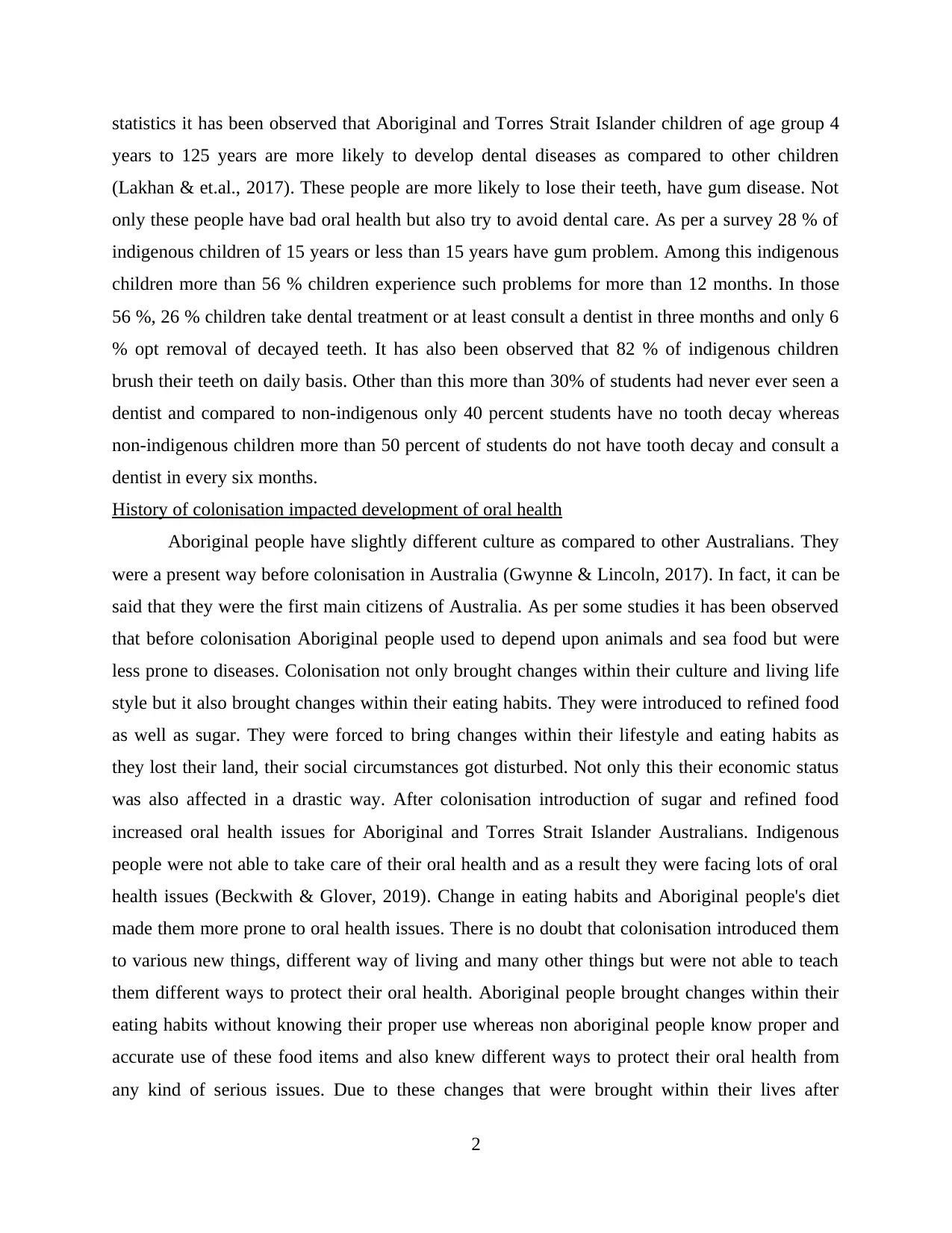
statistics it has been observed that Aboriginal and Torres Strait Islander children of age group 4
years to 125 years are more likely to develop dental diseases as compared to other children
(Lakhan & et.al., 2017). These people are more likely to lose their teeth, have gum disease. Not
only these people have bad oral health but also try to avoid dental care. As per a survey 28 % of
indigenous children of 15 years or less than 15 years have gum problem. Among this indigenous
children more than 56 % children experience such problems for more than 12 months. In those
56 %, 26 % children take dental treatment or at least consult a dentist in three months and only 6
% opt removal of decayed teeth. It has also been observed that 82 % of indigenous children
brush their teeth on daily basis. Other than this more than 30% of students had never ever seen a
dentist and compared to non-indigenous only 40 percent students have no tooth decay whereas
non-indigenous children more than 50 percent of students do not have tooth decay and consult a
dentist in every six months.
History of colonisation impacted development of oral health
Aboriginal people have slightly different culture as compared to other Australians. They
were a present way before colonisation in Australia (Gwynne & Lincoln, 2017). In fact, it can be
said that they were the first main citizens of Australia. As per some studies it has been observed
that before colonisation Aboriginal people used to depend upon animals and sea food but were
less prone to diseases. Colonisation not only brought changes within their culture and living life
style but it also brought changes within their eating habits. They were introduced to refined food
as well as sugar. They were forced to bring changes within their lifestyle and eating habits as
they lost their land, their social circumstances got disturbed. Not only this their economic status
was also affected in a drastic way. After colonisation introduction of sugar and refined food
increased oral health issues for Aboriginal and Torres Strait Islander Australians. Indigenous
people were not able to take care of their oral health and as a result they were facing lots of oral
health issues (Beckwith & Glover, 2019). Change in eating habits and Aboriginal people's diet
made them more prone to oral health issues. There is no doubt that colonisation introduced them
to various new things, different way of living and many other things but were not able to teach
them different ways to protect their oral health. Aboriginal people brought changes within their
eating habits without knowing their proper use whereas non aboriginal people know proper and
accurate use of these food items and also knew different ways to protect their oral health from
any kind of serious issues. Due to these changes that were brought within their lives after
2
years to 125 years are more likely to develop dental diseases as compared to other children
(Lakhan & et.al., 2017). These people are more likely to lose their teeth, have gum disease. Not
only these people have bad oral health but also try to avoid dental care. As per a survey 28 % of
indigenous children of 15 years or less than 15 years have gum problem. Among this indigenous
children more than 56 % children experience such problems for more than 12 months. In those
56 %, 26 % children take dental treatment or at least consult a dentist in three months and only 6
% opt removal of decayed teeth. It has also been observed that 82 % of indigenous children
brush their teeth on daily basis. Other than this more than 30% of students had never ever seen a
dentist and compared to non-indigenous only 40 percent students have no tooth decay whereas
non-indigenous children more than 50 percent of students do not have tooth decay and consult a
dentist in every six months.
History of colonisation impacted development of oral health
Aboriginal people have slightly different culture as compared to other Australians. They
were a present way before colonisation in Australia (Gwynne & Lincoln, 2017). In fact, it can be
said that they were the first main citizens of Australia. As per some studies it has been observed
that before colonisation Aboriginal people used to depend upon animals and sea food but were
less prone to diseases. Colonisation not only brought changes within their culture and living life
style but it also brought changes within their eating habits. They were introduced to refined food
as well as sugar. They were forced to bring changes within their lifestyle and eating habits as
they lost their land, their social circumstances got disturbed. Not only this their economic status
was also affected in a drastic way. After colonisation introduction of sugar and refined food
increased oral health issues for Aboriginal and Torres Strait Islander Australians. Indigenous
people were not able to take care of their oral health and as a result they were facing lots of oral
health issues (Beckwith & Glover, 2019). Change in eating habits and Aboriginal people's diet
made them more prone to oral health issues. There is no doubt that colonisation introduced them
to various new things, different way of living and many other things but were not able to teach
them different ways to protect their oral health. Aboriginal people brought changes within their
eating habits without knowing their proper use whereas non aboriginal people know proper and
accurate use of these food items and also knew different ways to protect their oral health from
any kind of serious issues. Due to these changes that were brought within their lives after
2
Paraphrase This Document
Need a fresh take? Get an instant paraphrase of this document with our AI Paraphraser
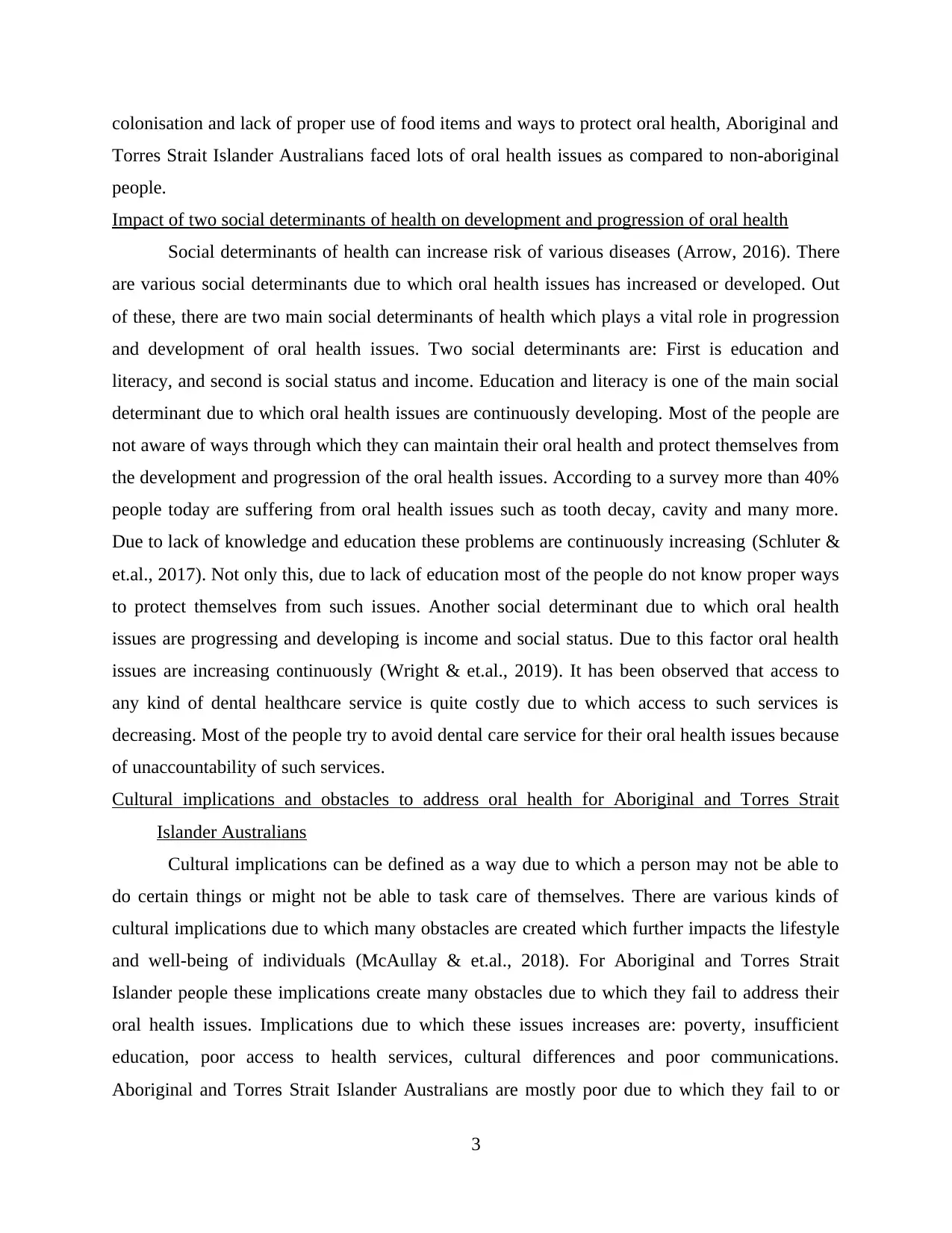
colonisation and lack of proper use of food items and ways to protect oral health, Aboriginal and
Torres Strait Islander Australians faced lots of oral health issues as compared to non-aboriginal
people.
Impact of two social determinants of health on development and progression of oral health
Social determinants of health can increase risk of various diseases (Arrow, 2016). There
are various social determinants due to which oral health issues has increased or developed. Out
of these, there are two main social determinants of health which plays a vital role in progression
and development of oral health issues. Two social determinants are: First is education and
literacy, and second is social status and income. Education and literacy is one of the main social
determinant due to which oral health issues are continuously developing. Most of the people are
not aware of ways through which they can maintain their oral health and protect themselves from
the development and progression of the oral health issues. According to a survey more than 40%
people today are suffering from oral health issues such as tooth decay, cavity and many more.
Due to lack of knowledge and education these problems are continuously increasing (Schluter &
et.al., 2017). Not only this, due to lack of education most of the people do not know proper ways
to protect themselves from such issues. Another social determinant due to which oral health
issues are progressing and developing is income and social status. Due to this factor oral health
issues are increasing continuously (Wright & et.al., 2019). It has been observed that access to
any kind of dental healthcare service is quite costly due to which access to such services is
decreasing. Most of the people try to avoid dental care service for their oral health issues because
of unaccountability of such services.
Cultural implications and obstacles to address oral health for Aboriginal and Torres Strait
Islander Australians
Cultural implications can be defined as a way due to which a person may not be able to
do certain things or might not be able to task care of themselves. There are various kinds of
cultural implications due to which many obstacles are created which further impacts the lifestyle
and well-being of individuals (McAullay & et.al., 2018). For Aboriginal and Torres Strait
Islander people these implications create many obstacles due to which they fail to address their
oral health issues. Implications due to which these issues increases are: poverty, insufficient
education, poor access to health services, cultural differences and poor communications.
Aboriginal and Torres Strait Islander Australians are mostly poor due to which they fail to or
3
Torres Strait Islander Australians faced lots of oral health issues as compared to non-aboriginal
people.
Impact of two social determinants of health on development and progression of oral health
Social determinants of health can increase risk of various diseases (Arrow, 2016). There
are various social determinants due to which oral health issues has increased or developed. Out
of these, there are two main social determinants of health which plays a vital role in progression
and development of oral health issues. Two social determinants are: First is education and
literacy, and second is social status and income. Education and literacy is one of the main social
determinant due to which oral health issues are continuously developing. Most of the people are
not aware of ways through which they can maintain their oral health and protect themselves from
the development and progression of the oral health issues. According to a survey more than 40%
people today are suffering from oral health issues such as tooth decay, cavity and many more.
Due to lack of knowledge and education these problems are continuously increasing (Schluter &
et.al., 2017). Not only this, due to lack of education most of the people do not know proper ways
to protect themselves from such issues. Another social determinant due to which oral health
issues are progressing and developing is income and social status. Due to this factor oral health
issues are increasing continuously (Wright & et.al., 2019). It has been observed that access to
any kind of dental healthcare service is quite costly due to which access to such services is
decreasing. Most of the people try to avoid dental care service for their oral health issues because
of unaccountability of such services.
Cultural implications and obstacles to address oral health for Aboriginal and Torres Strait
Islander Australians
Cultural implications can be defined as a way due to which a person may not be able to
do certain things or might not be able to task care of themselves. There are various kinds of
cultural implications due to which many obstacles are created which further impacts the lifestyle
and well-being of individuals (McAullay & et.al., 2018). For Aboriginal and Torres Strait
Islander people these implications create many obstacles due to which they fail to address their
oral health issues. Implications due to which these issues increases are: poverty, insufficient
education, poor access to health services, cultural differences and poor communications.
Aboriginal and Torres Strait Islander Australians are mostly poor due to which they fail to or
3
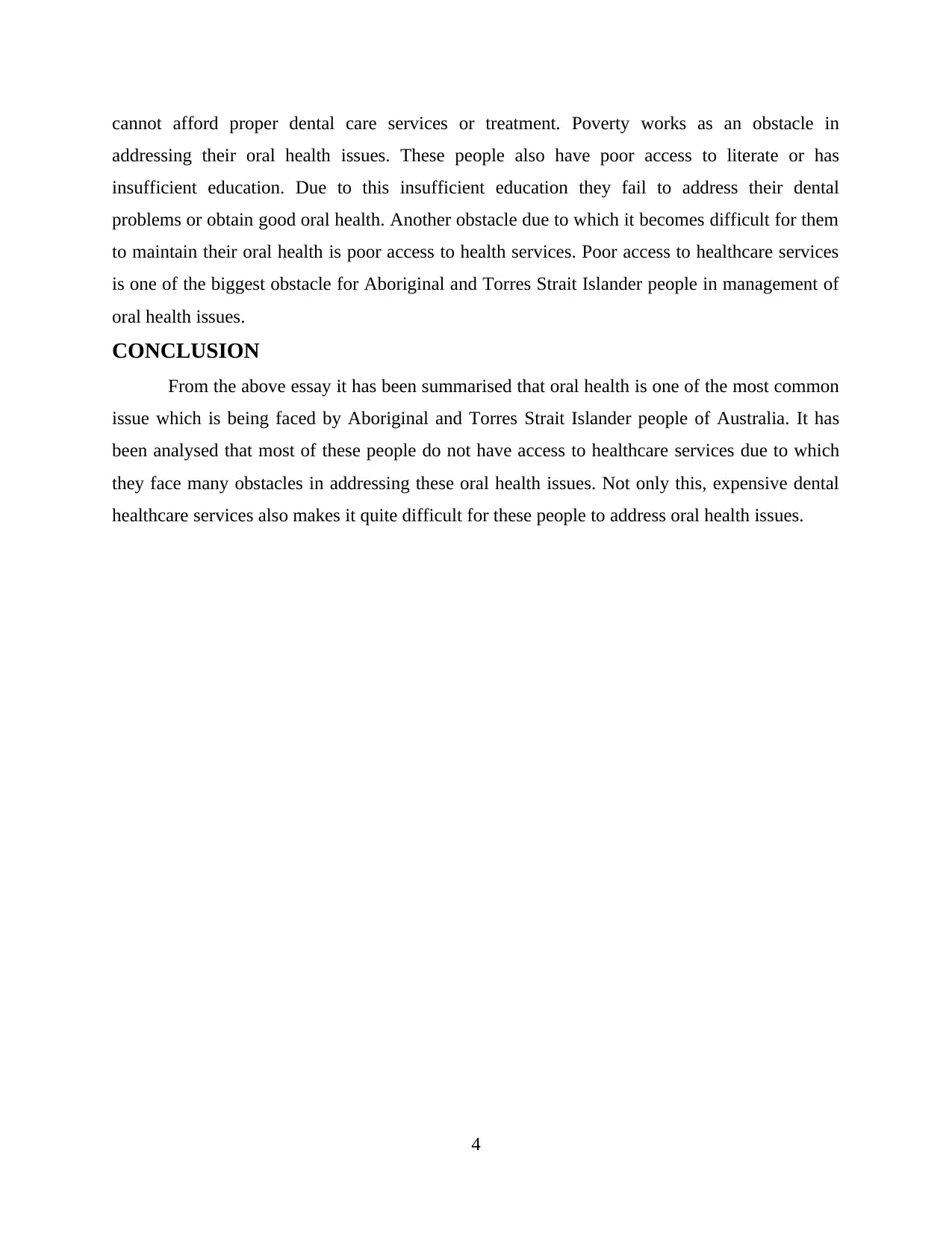
cannot afford proper dental care services or treatment. Poverty works as an obstacle in
addressing their oral health issues. These people also have poor access to literate or has
insufficient education. Due to this insufficient education they fail to address their dental
problems or obtain good oral health. Another obstacle due to which it becomes difficult for them
to maintain their oral health is poor access to health services. Poor access to healthcare services
is one of the biggest obstacle for Aboriginal and Torres Strait Islander people in management of
oral health issues.
CONCLUSION
From the above essay it has been summarised that oral health is one of the most common
issue which is being faced by Aboriginal and Torres Strait Islander people of Australia. It has
been analysed that most of these people do not have access to healthcare services due to which
they face many obstacles in addressing these oral health issues. Not only this, expensive dental
healthcare services also makes it quite difficult for these people to address oral health issues.
4
addressing their oral health issues. These people also have poor access to literate or has
insufficient education. Due to this insufficient education they fail to address their dental
problems or obtain good oral health. Another obstacle due to which it becomes difficult for them
to maintain their oral health is poor access to health services. Poor access to healthcare services
is one of the biggest obstacle for Aboriginal and Torres Strait Islander people in management of
oral health issues.
CONCLUSION
From the above essay it has been summarised that oral health is one of the most common
issue which is being faced by Aboriginal and Torres Strait Islander people of Australia. It has
been analysed that most of these people do not have access to healthcare services due to which
they face many obstacles in addressing these oral health issues. Not only this, expensive dental
healthcare services also makes it quite difficult for these people to address oral health issues.
4
⊘ This is a preview!⊘
Do you want full access?
Subscribe today to unlock all pages.

Trusted by 1+ million students worldwide
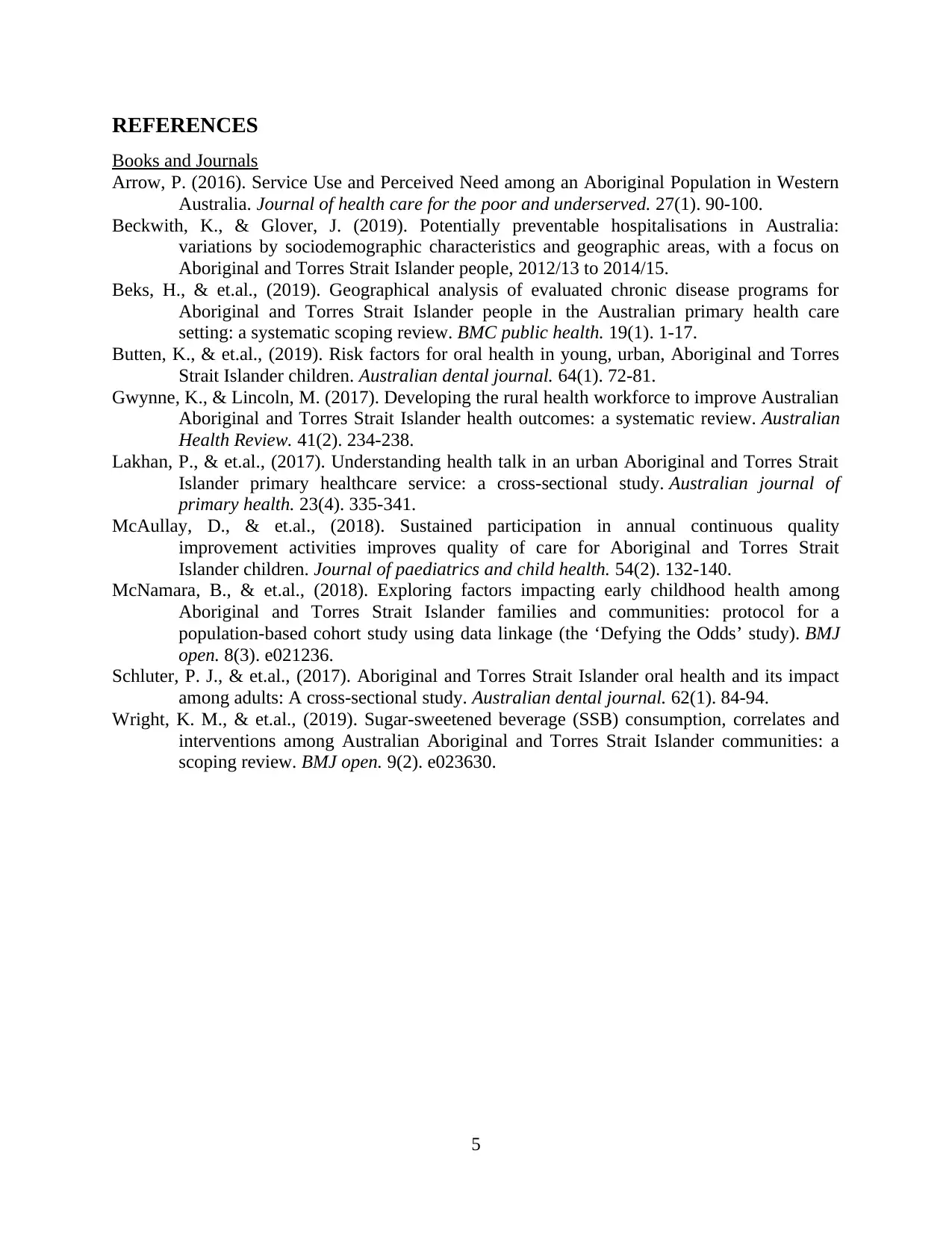
REFERENCES
Books and Journals
Arrow, P. (2016). Service Use and Perceived Need among an Aboriginal Population in Western
Australia. Journal of health care for the poor and underserved. 27(1). 90-100.
Beckwith, K., & Glover, J. (2019). Potentially preventable hospitalisations in Australia:
variations by sociodemographic characteristics and geographic areas, with a focus on
Aboriginal and Torres Strait Islander people, 2012/13 to 2014/15.
Beks, H., & et.al., (2019). Geographical analysis of evaluated chronic disease programs for
Aboriginal and Torres Strait Islander people in the Australian primary health care
setting: a systematic scoping review. BMC public health. 19(1). 1-17.
Butten, K., & et.al., (2019). Risk factors for oral health in young, urban, Aboriginal and Torres
Strait Islander children. Australian dental journal. 64(1). 72-81.
Gwynne, K., & Lincoln, M. (2017). Developing the rural health workforce to improve Australian
Aboriginal and Torres Strait Islander health outcomes: a systematic review. Australian
Health Review. 41(2). 234-238.
Lakhan, P., & et.al., (2017). Understanding health talk in an urban Aboriginal and Torres Strait
Islander primary healthcare service: a cross-sectional study. Australian journal of
primary health. 23(4). 335-341.
McAullay, D., & et.al., (2018). Sustained participation in annual continuous quality
improvement activities improves quality of care for Aboriginal and Torres Strait
Islander children. Journal of paediatrics and child health. 54(2). 132-140.
McNamara, B., & et.al., (2018). Exploring factors impacting early childhood health among
Aboriginal and Torres Strait Islander families and communities: protocol for a
population-based cohort study using data linkage (the ‘Defying the Odds’ study). BMJ
open. 8(3). e021236.
Schluter, P. J., & et.al., (2017). Aboriginal and Torres Strait Islander oral health and its impact
among adults: A cross‐sectional study. Australian dental journal. 62(1). 84-94.
Wright, K. M., & et.al., (2019). Sugar-sweetened beverage (SSB) consumption, correlates and
interventions among Australian Aboriginal and Torres Strait Islander communities: a
scoping review. BMJ open. 9(2). e023630.
5
Books and Journals
Arrow, P. (2016). Service Use and Perceived Need among an Aboriginal Population in Western
Australia. Journal of health care for the poor and underserved. 27(1). 90-100.
Beckwith, K., & Glover, J. (2019). Potentially preventable hospitalisations in Australia:
variations by sociodemographic characteristics and geographic areas, with a focus on
Aboriginal and Torres Strait Islander people, 2012/13 to 2014/15.
Beks, H., & et.al., (2019). Geographical analysis of evaluated chronic disease programs for
Aboriginal and Torres Strait Islander people in the Australian primary health care
setting: a systematic scoping review. BMC public health. 19(1). 1-17.
Butten, K., & et.al., (2019). Risk factors for oral health in young, urban, Aboriginal and Torres
Strait Islander children. Australian dental journal. 64(1). 72-81.
Gwynne, K., & Lincoln, M. (2017). Developing the rural health workforce to improve Australian
Aboriginal and Torres Strait Islander health outcomes: a systematic review. Australian
Health Review. 41(2). 234-238.
Lakhan, P., & et.al., (2017). Understanding health talk in an urban Aboriginal and Torres Strait
Islander primary healthcare service: a cross-sectional study. Australian journal of
primary health. 23(4). 335-341.
McAullay, D., & et.al., (2018). Sustained participation in annual continuous quality
improvement activities improves quality of care for Aboriginal and Torres Strait
Islander children. Journal of paediatrics and child health. 54(2). 132-140.
McNamara, B., & et.al., (2018). Exploring factors impacting early childhood health among
Aboriginal and Torres Strait Islander families and communities: protocol for a
population-based cohort study using data linkage (the ‘Defying the Odds’ study). BMJ
open. 8(3). e021236.
Schluter, P. J., & et.al., (2017). Aboriginal and Torres Strait Islander oral health and its impact
among adults: A cross‐sectional study. Australian dental journal. 62(1). 84-94.
Wright, K. M., & et.al., (2019). Sugar-sweetened beverage (SSB) consumption, correlates and
interventions among Australian Aboriginal and Torres Strait Islander communities: a
scoping review. BMJ open. 9(2). e023630.
5
1 out of 7
Related Documents
Your All-in-One AI-Powered Toolkit for Academic Success.
+13062052269
info@desklib.com
Available 24*7 on WhatsApp / Email
![[object Object]](/_next/static/media/star-bottom.7253800d.svg)
Unlock your academic potential
Copyright © 2020–2026 A2Z Services. All Rights Reserved. Developed and managed by ZUCOL.




